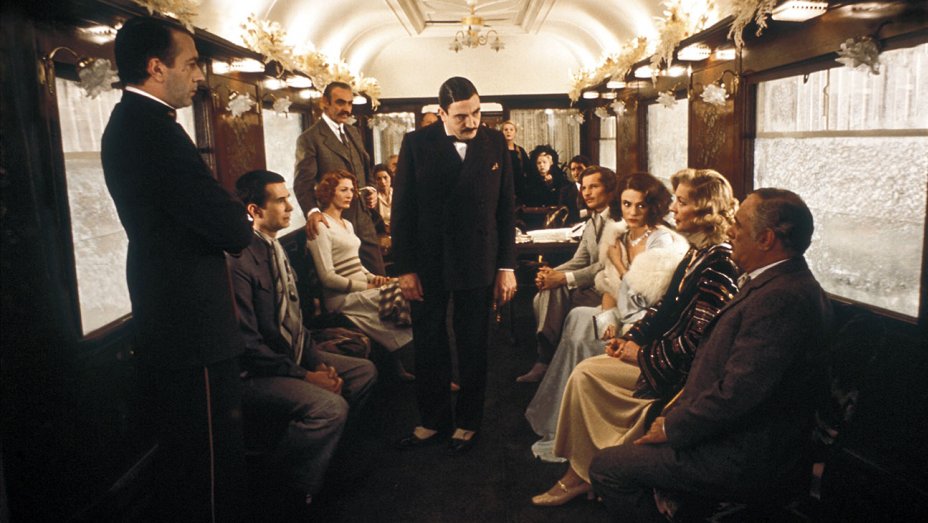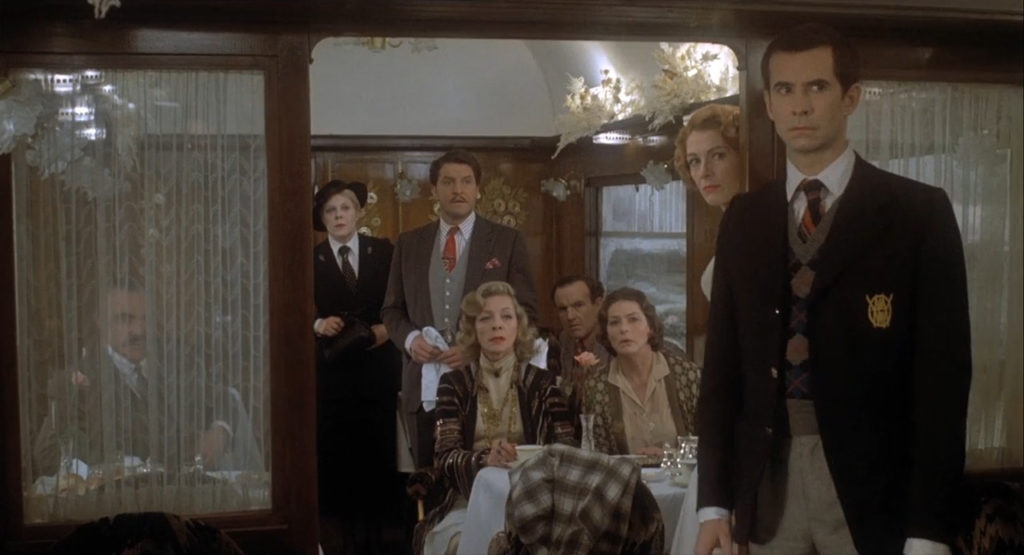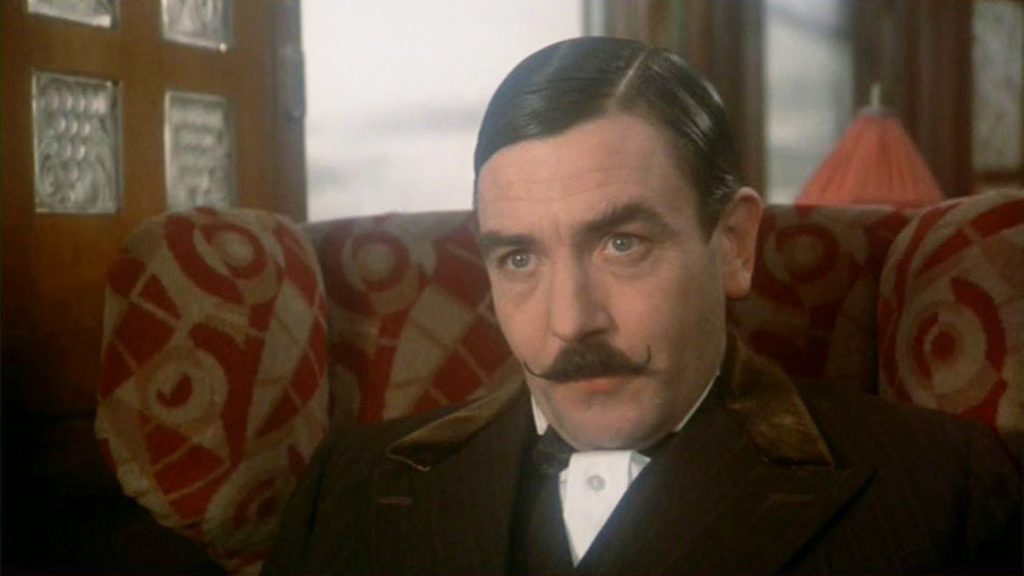This post is part of the Winter in July blogathon, hosted by Moon in Gemini. See the other posts here.
The phrase ‘all-star cast’ can seem hackneyed these days, done to death alongside trailers that begin “in a world” and posters with faces overlaid with text. Yet Sidney Lumet’s Murder on the Orient Express is worthy of the term: a glamorous murder-mystery boasting so many stars they’re listed in alphabetical order. It’s a Who’s Who crossed with a whodunit.
After wrapping up his latest case, detective Hercule Poirot (Albert Finney) is in Istanbul on his way back to London and decides to book a compartment on the Orient Express, leaving that night. It’s December but the first-class carriage is fully-booked and Poirot only gets a berth via the intervention of his friend Signor Bianchi (Martin Balsam), a director of the line who also happens to be on the train. Travelling alongside them is a motley assortment of passengers: Harriet Hubbard (Lauren Bacall), a brash, twice-widowed American; Samuel Ratchett (Richard Widmark), an American businessman, Hector McQueen (Anthony Perkins), his high-strung secretary and Beddoes (John Gielgud), his English valet; Hungarian diplomat Count Andrenyi (Michael York) and his wife the Countess (Jacqueline Bisset); Greta Ohlsson (Ingrid Bergman), a timid Swedish missionary; Colonel John Arbuthnot (Sean Connery), a British officer; Mary Debenham (Vanessa Redgrave), an English teacher; elderly Russian Princess Dragomiroff (Wendy Hiller) and her German maid, Hildegarde Schmidt (Rachel Roberts); Italian-American car salesman Antonio Foscarelli (Denis Quilley); and Cyrus Hardman (Colin Blakely), an American theatrical agent. Waiting on them all is Pierre Michel (Jean-Pierre Cassel), the Wagon-Lit conductor.
Lumet evokes the Age of Elegance not as it was, but as it appeared on film and treats the Orient Express as one of the film’s stars. We see loving shots of supplies—oranges, oysters, wine—being loaded onto the train and it departs swathed in fog, waltzing out of the station to Richard Rodney Bennett’s shimmering score.
The day after the train leaves Istanbul Ratchett attempts to hire Poirot as a bodyguard, dangling a large fee for his services. But he lies about his past and refuses to fully explain why anyone would send him death threats. Bored, Poirot turns him down, a decision he comes to regret when Ratchett is found dead in his compartment the next morning—stabbed 12 times in the chest. With the train stranded in a snowdrift and a massive scandal on his hands, Bianchi begs Poirot to find Ratchett’s killer before the local Yugoslavian police arrive.
Poirot had appeared on screen before. Austin Trevor played him first in the 1930s, and Tony Randall followed in The Alphabet Murders, a 1965 satire which played the original novel for laughs and may have contributed to Agatha Christie’s initial reluctance to sell any more film rights. Lumet’s genius was to give Christie’s work the lavish Grand Hotel treatment—an approach so successful it set the template for decades of Christie adaptations, including Kenneth Brannagh’s 2017 remake.
Wisely, Paul Dehn’s screenplay stays close to Christie’s story. Poirot discovers charred fragments of paper in Ratchett’s compartment which reveal he was really Casetti, the mastermind behind the kidnapping and murder of little Daisy Armstrong—a reference to the Lindbergh kidnapping, which had made international headlines in 1932, two years before Murder on the Orient Express was published. The snowdrift was also inspired by real life: a few months after Christie’s first trip on the train in 1928, the Orient Express was stranded for six days by a blizzard in Turkey.
Snow envelops the story, pressing against the train’s windows and creating a closed circle cut off from the world. It also acts as a ticking clock: Poirot must solve the case before the train is dug out.
This brings us to the film’s only flaw: Albert Finney as Poirot. It isn’t that Finney doesn’t try. He hunches his shoulders and tilts his head down, compressing himself into an approximation of Poirot’s trademark egg shape. Yet he spends so much time on caricature he forgets to make the detective feel real. In Christie’s books Poirot is pompous, eccentric, a trifle absurd, but also convincingly human. Finney’s version is a creature of cogs and gears. His Oscar nomination for this performance is almost as puzzling as the mystery itself.
Luckily the suspects are more entertaining. Lauren Bacall has a ball as Mrs. Hubbard, a brassy dame whose barrage of conversation is always peppered with references to her late husbands. After a few scenes you suspect the men may have died simply to escape her company. Anthony Perkins’ voice is full of quavers as McQueen, who always seems close to cracking and Wendy Hiller’s Princess Dragomiroff is the most magnificent of grande dames. When Poirot questions her, she asks: “Do you wish me to confess to the murder of what’s his name?” Plus there’s Ingrid Bergman’s Oscar-winning performance as Miss Ohlsson. Of all the stars, Bergman is the only one you cease to be aware of as the film progresses: she becomes a mousey woman who just happens to resemble Bergman.
Murder on the Orient Express is a marvellous soufflé that even a miscast Finney can’t deflate. Watch it and treat yourself to one of the most thoroughly enjoyable Agatha Christie adaptations ever made.



It’s true. There are so many marvelous aspects to this version of Murder on the Orient Express that we can forgive, or at least overlook Finney’s odd interpretation of the little Belgium. Ah, but imagine your favourite Poirot, whoever that may be, placed in the middle of this cast. Bliss.
Snow as a ticking clock. Indeed, we can’t forget the snow in watching this movie.
Hello Patricia, yes, you’re right. David Suchet is my favourite Poirot and I can’t help but imagine how wonderful he would have been in Lumet’s film instead. I like the version Suchet actually starred in as well, but it’s a little too gloomy by comparison. Who’s your favourite Poirot?
I always want Poirot to be Peter Ustinov – I can’t help myself!
Have you seen the most recent version with Kenneth Brannagh? I’d be interested to hear what you think
Ustinov is my second favourite, after David Suchet.
No, I haven’t seen the Brannagh version yet. I tend to like Brannagh’s films, but I found the multiple changes to the book off-putting. Plus there’s his moustache. I’ll get round to seeing it eventually.
I haven’t seen this film in many years. I agree Finney was a very odd choice. But the rest of the cast! Wow!
The recent remake is not bad at all. Kenneth Branagh is not an ideal Poirot, either, and his direction is (as usual) over-the-top, but the film is breathtaking to look at.
Thanks so much for contributing to the blogathon!
Yes, the rest of the cast is wonderful.
I have a soft spot for Kenneth Branagh – even for the slightly loopy ‘Dead Again’ – but the major changes his version made to the book (and that ridiculous moustache) haven’t encouraged me to watch. I suppose I should give it a go.
Also, I really enjoyed writing this post. Thanks for including me.